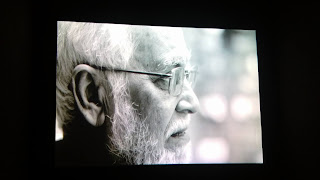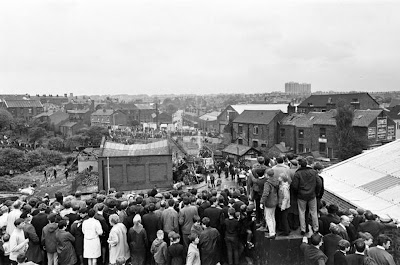HOME1947
The 1947 partition of British India, creating the two new independent states of India and Pakistan, displaced somewhere between 10 and 12 million people along religious lines. A division was made by a newly-drawn border known as the Radcliffe Line with the Muslim population travelling across in one direction and the Hindu and Sikh populations moving in the other. The accompanying outburst of sectarian and sexual violence, along with looting, murder and general destruction, killed an estimated two million people and plagues diplomatic and social relationships between India and Pakistan to this day.
There is no doubt that the theme of HOME1947, Sharmeen Obaid-Chinoy's unique and fascinating new exhibition, is highly relevant for 2017's Manchester International Festival. This July marks exactly 70 years since the passing of the Indian Independence Act and, all too tragically, another refugee crisis is affecting millions in today's turbulent world.
HOME1947 adopts a unique approach to history. Obaid-Chinoy chooses to veer away from themes of religion and politics. "When we think about refugees and wars and displacement, it's all too political today," she says, "it's about 'us' and 'them.'"
As such, rather than use the words of historians or politicians, HOME1947 uses those of the normal, everyday people who lived through the partition. On many occasions words are completely replaced -by photos, objects, films, songs and even smells. The result is moving and thoroughly unique: an immersive, technologically-advanced experience like no other.
The darkness upon entering the exhibition is immediately notable. It serves to heighten the sense of smell, making the distant, subcontinental aromas which have somehow been replicated in The Lowry's Aldridge Studio prevalent. Obaid-Chinoy's aim to "make people to feel like they are back in the Indian subcontinent in 1947" has already been achieved and we can't even see anything.
Pushing through heavy black curtains leads to a small cinema set up. Wireless headphones are placed on rows of benches as a series of short films is projected onto the screen. These shorts introduce us to 1947 in India from a number of perspectives. All are deeply poignant. In one, a lady sings a hopeful song whilst leaving her home on a hopelessly overcrowded train. Another remembers childhood fun and games before the partition through poetry. Most movingly, we hear an elderly gentleman recalling his late mother: the songs she used to sing, the food she used to make - and the clothes she was wearing on the day she was killed in the violence of 1947.
At no point, it should be noted, are we given any indication of whether the voices come from the Indian or the Pakistani side of the Radcliffe Line. This is testament to Obaid-Chinoy's aim to keep politics, nationalism and sectarianism out of the picture. “It’s not about who did what," she affirms. "It’s about the individual and their experience.”
Moving on, through what might be described as an audio tunnel, the themes of forced movement and displacement are symbolised powerfully. As we walk, the light behind us shuts off, as the light ahead illuminates and pulls us forward. Like the millions in 1947, we must go on, and cannot go back.
Emerging onto the stage of the Studio, the exhibition reaches its visual and technological peak. Three suitcases are suspended from above, their meagre contents emphasising just how little of 'home' a migrant was able to take with them. More headphones, hang down, allowing us the chance to hear personal, individual stories of upheaval, again from the view of ordinary subjects. Unlike in other exhibitions, the words of those who do not speak English are not translated by an impersonal, alien voice. The authenticity certainly adds to the experience.
The highlight for many will be the virtual reality headsets, which also hang from the ceiling. Putting one on transports us to the interior of a deserted house - somewhere, before the events of summer 1947, a family called home. Having never used such technology before, the VR is a real treat. Moreover, having heard the testimonies of those who were displaced in India 70 years ago - and knowing that so many are forced to do so today - it complements the exhibition perfectly. While 'standing' in the lonely house, reaching out to the empty spaces and abandoned furniture, Obaid-Chinoy's message truly resonates: "leaving your home changes you forever."
HOME1947 is part of the Manchester International Festival 2017 and is at The Lowry, Salford Quays until Sunday 9th July.
Entrance is free.
For more information click here.
For a full listing of MIF17 events click here.
Words: Samuel Wilson (sammy@quaytickets,com). Sharmeen Obaid-Chinoy quotations from The National.








Comments
Post a Comment